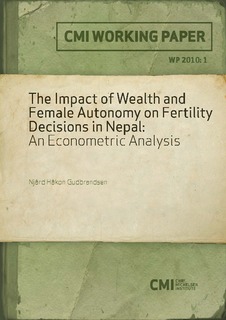| dc.description.abstract | Over the last fifteen years, the fertility rate in Nepal has declined significantly. In the same period, the country has, despite political unrest and a civil war, experienced economic growth. In contrast with its neighboring countries, India and China, Nepal has not used legal action to limit its population growth. The fertility rate in Nepal is now below India’s and is reaching the replacement rate. In this thesis I explore the role of families’ wealth and female autonomy in determining individual fertility. Using cross-sectional household data from 2006, I test the effect of wealth, female autonomy and other socioeconomic factors on the number of children. Except for wealth and female autonomy, emphasis is put on the strong preference for boys in Nepalese society. Preference for boys is tested using the gender of the first child as a natural experiment. The theoretical foundation is based on Gary Becker’s work, which assumes a trade-off between the number of children and the human capital invested in them. My findings suggest that female autonomy is an important determinant of individual fertility, with households where the husband has relatively more power having significantly more children compared to other groups. Wealth and education are also important determinants, but the effect of female education is only significant for low levels of education. A preference for boys is present and this might have consequences, as sex-selective abortions are a potential threat when son preferences are accompanied by decreasing fertility. | |
